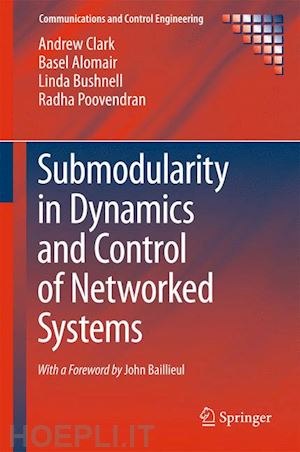
Questo prodotto usufruisce delle SPEDIZIONI GRATIS
selezionando l'opzione Corriere Veloce in fase di ordine.
Pagabile anche con Carta della cultura giovani e del merito, 18App Bonus Cultura e Carta del Docente
This book presents a framework for the control of networked systems utilizing submodular optimization techniques. The main focus is on selecting input nodes for the control of networked systems, an inherently discrete optimization problem with applications in power system stability, social influence dynamics, and the control of vehicle formations. The first part of the book is devoted to background information on submodular functions, matroids, and submodular optimization, and presents algorithms for distributed submodular optimization that are scalable to large networked systems.
In turn, the second part develops a unifying submodular optimization approach to controlling networked systems based on multiple performance and controllability criteria. Techniques are introduced for selecting input nodes to ensure smooth convergence, synchronization, and robustness to environmental and adversarial noise. Submodular optimization is the first unifying approach towards guaranteeing both performance and controllability with provable optimality bounds in static as well as time-varying networks. Throughout the text, the submodular framework is illustrated with the help of numerical examples and application-based case studies in biological, energy and vehicular systems.
The book effectively combines two areas of growing interest, and will be especially useful for researchers in control theory, applied mathematics, networking or machine learning with experience in submodular optimization but who are less familiar with the problems and tools available for networked systems (or vice versa). It will also benefit graduate students, offering consistent terminology and notation that greatly reduces the initial effort associated with beginning a course of study in a new area.
Part I: Submodular Functions and Optimization.- Submodular Functions and Matroids.- Centralized Submodular Maximization.- Distributed Submodular Maximization.- Submodularity in Dynamics and Control.- Background on Control of Networked Systems.- Submodular Optimization for Smooth Convergence in Networked Systems.- Selecting Catalyst Nodes for Synchronization.- Input Selection for Robustness to Noise.- Input Node Selection under Noise Injection Attacks.- Input Node Selection for Joint Performance and Controllability.
Basel Alomair is an Assistant Professor and Founding Director of the National Center for Cybersecurity Technology (C4C) in King Abdulaziz City for Science and Technology (KACST), an Affiliate Professor and co-director of the Network Security Lab (NSL) at the University of Washington-Seattle, an Affiliate Professor at King Saud University (KSU), and a cryptology consultant at various agencies. He was recognized by the IEEE Technical Committee on Fault-Tolerant Computing (TC-FTC) and the IFIP Working Group on Dependable Computing and Fault Tolerance (WG 10.4) with the 2010 IEEE/IFIP William Carter Award for his significant contributions in the area of dependable computing. His research in information security was recognized with the 2011 Outstanding Research Award from the University of Washington. He was also the recipient of the 2012 Distinguished Dissertation Award from the Center for Information Assurance and Cybersecurity at the University of Washington (UW CIAC). He was awarded the 2015 Early Career Award in Cybersecurity by the NSA/DHS Center of Academic Excellence in Information Assurance Research for his contributions to Modern Cryptographic Systems and Visionary Leadership. He authored/co-authored multiple best paper awards.











Il sito utilizza cookie ed altri strumenti di tracciamento che raccolgono informazioni dal dispositivo dell’utente. Oltre ai cookie tecnici ed analitici aggregati, strettamente necessari per il funzionamento di questo sito web, previo consenso dell’utente possono essere installati cookie di profilazione e marketing e cookie dei social media. Cliccando su “Accetto tutti i cookie” saranno attivate tutte le categorie di cookie. Per accettare solo deterninate categorie di cookie, cliccare invece su “Impostazioni cookie”. Chiudendo il banner o continuando a navigare saranno installati solo cookie tecnici. Per maggiori dettagli, consultare la Cookie Policy.